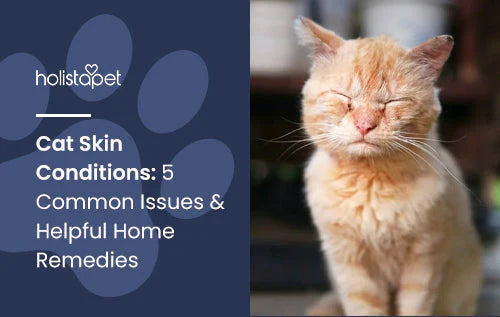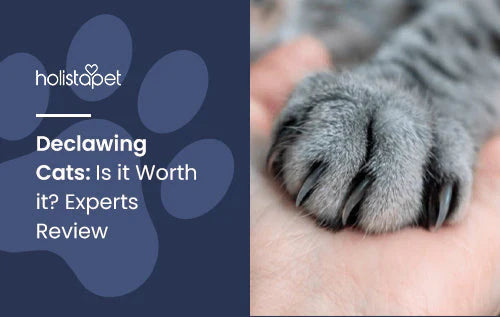If you've noticed that your cat is scratching or grooming itself more than usual lately, your feline friend may be suffering from a skin condition.
Cat skin conditions can vary in severity and have assorted causes, and it is essential to recognize these problems early so you can remedy them before they worsen. Just as with humans, the skin is the largest organ of a cat, making up about 1/4 of its body weight. With the skin being such a prominent portion of a cat's body, it is crucial to take good care of it and ensure that your cat lives comfortably without any issues.
The following will highlight some common cat skin conditions, how one can recognize these conditions, some remedies to help ease these skin issues, and when necessary, to seek medical attention.
What Kinds of Skin Conditions Can Cats Get?
Cat skin conditions can take many different forms. Your feline friend may experience irritating symptoms ranging from loss of fur, swelling of the skin, scabs, and cat acne. These problems can stem from fleas, allergies, nutritional deficiencies, or a cat's environment.
These issues may require specific remedies to conceal and heal them, which we will further explore. If you’re ever in doubt about your cat’s condition, we ALWAYS recommend visiting your vet for professional guidance.
Common Cat Skin Conditions
Here are some of the most common cat skin conditions your feline buddy may develop. As a cat owner, it is crucial that you know how to recognize these conditions so your cat can get treatment and recover ASAP.
Parasites
Parasites are tiny organisms that live on the skin and feed off of a host's body — in this case, your cat. The kind of parasites that cats may attract are fleas and ticks. Fleas are pesky little creatures that can cause skin irritation and itchiness.
Fleas usually gravitate towards the warmer areas on the skin. So if you notice your cat scratching around their rear or behind the ears, you may want to check to see if they are infected with fleas.
Fleas may be challenging to detect because of their size and how quickly they move. But if you use a fine comb to sift through their fur, you may be able to spot some little moving dots. You can then kill the fleas by spraying the area with a flea spray. Knowing how to identify and remove fleas will definitely help alleviate your cat's itchy skin.
Ticks are another kind of tiny, blood-sucking parasite attracted to warm-blooded creatures, such as cats. They can attach to your cat's skin, leaving them with bumps and swelling. These bumps and swellings on your cat's skin demonstrate the body fighting back against the tick. Although the body naturally wants to defend against these little bloodsuckers, overall, dealing with ticks may be irritating for your cat.

Related Post: Harvest Mites on Cats [Identification + Relief Options]
Dry Skin
Dry cat skin can result from weather extremes. These conditions often occur in the cold winter or the summer heat. Poor nutrition or an unbalanced diet lacking in healthy fats can also cause dry skin.
If you're aware of upcoming weather changes, this can help you predict when your cat may experience dry skin. If you feel any dry areas on your cat's skin upon inspection, you may want to check in with your veterinarian about switching their diet or finding other cures.
Scabs
Sores or scabs may be another indicator that your cat's skin is in trouble. Scabs are caused by military dermatitis, which is a general term that can refer to cat acne, eczema, and other skin issues. You can spot scabs by looking for blotchy spots on your cat’s fur or redness on any part of the skin. These particular skin issues can arise due to changing diet, new bedding, certain allergies, overgrooming, or contact with parasites.
Related Post: Cat Wound Care, Recovery, & Comforting Tips
Hair Loss
Hair loss in cats is a common sign of a skin condition. For cats, hair loss can be a result of two different causes: alopecia and barbering. Alopecia is a condition that results in hair thinning or falling out of the hair follicle. Alopecia can arise from several reasons such as allergies, parasites, infections, or nutritional deficiencies.
As for barbering, this refers to self-induced thinning or balding. This means that your cat is attempting to alleviate their irritated skin by gnawing or over-grooming themself, leading to hair loss.
However, your cat may also be barbering because they are experiencing some type of stress. Just like humans, cats can also experience different kinds of stress when introduced to changes or uncomfortable situations, like a new home or family member. So it is important to take note of any changes in your cat's life that may be causing them stress.
Allergies
Similar to the way humans can develop allergies to different things, cats can also experience allergies. If you notice your cat scratching or developing any redness on their skin, they might be having an allergic reaction. Allergies can be caused by a number of substances. Natural environments, shampoos, food, fleas, other parasites, and household products can all trigger allergies.

Home Remedies for Cat Skin Conditions
Depending on how serious your cat's skin issues get, there may be a few home remedies that can help soothe irritation. Check out some tried-and-true remedies below!
Diet
Some cat skin issues may arise from their diet. It is crucial to keep an eye on your cat's food intake and whether certain foods trigger itchiness or irritation. To ensure that your cat's skin is healthy, it is best to maintain a high-quality diet and monitor how your cat reacts to certain foods.
Also, cutting back on treats may be a good idea if you begin to notice any skin issues. Many commercial treats contain by-products and fillers that cause food sensitivities and allergies in cats.
Related: Wet Food Vs Dry Cat Food: Why It Matters & What to Look For
Flea Collar
It is always unpleasant when you discover your feline friend has fleas. However, one way to control a flea problem is by providing your cat with a flea collar. Flea collars are an easy and effective way to avoid your cat getting any fleas. If your cat spends a lot of time outside, they may be more prone to picking up fleas and other pesky creatures, so giving them a flea collar can help.
Cone
If your cat tends to be the source of their own skin problems (i.e., they scratch or groom themselves to oblivion), then a cone might be the solution. As the name suggests, a cone is a cylindrical headpiece that you can place on your cat’s head. It prevents them from scratching those irritated areas, giving their skin a chance to heal.
Of course, your cat is not going to be a big fan of a cone. You can expect them to try to remove it in any way they can. You can try telling your cat that the cone is only a temporary measure — hopefully, they will understand.
Catnip Bath
Cats go nuts for catnip, but did you know it can soothe their skin too? You can make a catnip tea bath to calm itchy, inflamed skin pronto!
Simply fill the tub or sink with hot water and drop some catnip leaves. Let the nip’ soak for a few minutes to infuse the water (and let the water cool), and then coax your cat in the tub. The catnip infusion will make bath time a bit more enjoyable while reducing the swelling and itching on their skin.
Related: Why Do Cats Like Catnip? #1 Reason Why Cats Can't Resist

Shampoo
If your cat has dry or flaky skin, a medicated shampoo may do the trick. There are special medicated shampoos and CBD shampoos designed to soothe and relieve a cat's dry skin. It is necessary to research or check with your veterinarian before using a particular shampoo because there is a chance that your cat could have an allergic reaction.
Also, some shampoos include irritating ingredients that can actually make your cat’s condition worse. Avoid cleansers that include parabens, dyes, sulfates, and too many artificial fragrances.
CBD
One remedy to consider for your cat's skin problems is CBD. Either in the form of CBD oil for cats or capsules, CBD products may be beneficial for your cat to ease irritations and itchiness on the skin.
Specifically, HolistaPet's CBD products can be a great source of relief because they are made with all-natural, organic ingredients that support your cat’s body — no GMOs or artificial flavors included!
Both the capsules and oil contain nutritious superfoods (hemp seed oil and hemp powder) that provide your cat with essential proteins and omega fatty acids. These nutrients enhance dermal and coat health, keeping your cat’s skin soft and healthy!
CBD not only can be an alternative to remedy and soothe skin irritation, but it can also calm your cat and reduce their stress. As we all know, a relaxed cat scratches less!
Before purchasing any CBD products for your pet, it is important to know your cat's weight, specific conditions, and the possible side effects of taking CBD.
CBD is well-tolerated by the vast majority of pets, though it may cause mild dizziness, drowsiness, dry mouth, or diarrhea in the first few applications. Rest assured that these side effects often disappear with repeated use.
What Happens if You Don't Treat Your Cat's Skin Condition?
If you ignore your cat's skin conditions, it can lead to worse problems down the line. Especially with skin issues, your cat can further experience discomfort, permanent bald spots, dry skin, rashes, red spots, and scabs.
These skin issues can impact your cat's overall quality of life if not treated in a timely manner. Cat skin problems, such as dry skin and bald spots, can cause discomfort as your cat may have trouble maneuvering without wanting to lick or barber their skin constantly.
Rashes and red spots can leave permanent markings on your cat's skin, which can become difficult to conceal or remedy. Early detection of potential skin issues is always key to preventing any problems from getting worse.
If any skin condition does turn serious and at-home remedies are ineffective, seek medical attention immediately!

When to Go to the Vet
If your cat's skin condition starts to worsen or does not improve after a few days of attempting to remedy it at home, it’s best to refer to a veterinarian. A veterinarian can closely examine your cat's condition and prescribe medication or shampoo to ensure your cat is all good to go.
Final Thoughts - Cat Skin Conditions
Your feline friend may have sensitive skin, but it is not the end of the world. Your cat can develop many different skin conditions, such as fleas, dry skin, and allergies. But thankfully, there is a wide range of remedies that can alleviate your cat's skin issues, such as changing their food, shampoo, or giving them some CBD soft treats.
If you are interested in exploring more about the potential CBD can have your cat, explore our cat products such as capsules, oils, and treats.


 CBD Oil for Cats - Fast Acting
CBD Oil for Cats - Fast Acting
 CBD Cat Treats - Easy Dose
CBD Cat Treats - Easy Dose
 CBD Calming Chews for Cats - Highly Rated
CBD Calming Chews for Cats - Highly Rated
 CBG Oil for Dogs and Cats - Loved by Thousands
CBG Oil for Dogs and Cats - Loved by Thousands





Leave a comment
All comments are moderated before being published.
This site is protected by hCaptcha and the hCaptcha Privacy Policy and Terms of Service apply.